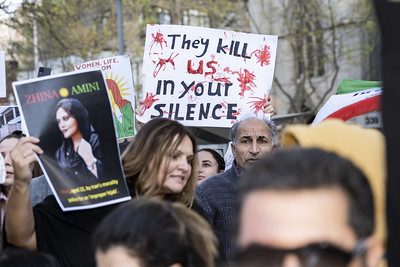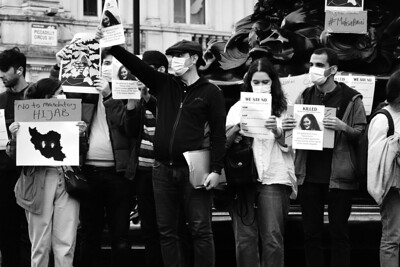The Importance of Speaking Up
People worldwide are outraged at the treatment of Iranian women.

PHOTO | Matt Hrkac
Protesters in Iran speak out against their oppressive government.
Worldwide protests have begun after 22 year old Mahsa Amini died in Iranian police custody. The Morality Police arrested Amini for violating the country’s strict dress code and she died Sept. 16 after allegedly being beaten into a coma.
Amini and her family took a train ride to Iran’s capital, Tehran, where the Morality police arrested her, because her hijab was not on correctly. After the police arrested Amini, they allegedly beat her and told everybody that she had a massive heart attack.
The Morality Police is a government organization that enforces Iranian dress code laws to “promote virtue and prevent vice,” the Jerusalem Post said. If the dress code is violated, the accused will be taken into custody and transported to a “re-education center” that reinforces Iranian dress code laws. In these centers, women are forced to participate in classes to relearn the rules that make up the dress code. According to the executive director of the New York-based Center for Human Rights, these re-education centers were opened in 2019, long before this tragic incident.
Violence against women is not a foreign occurrence in Iran, and Amini’s death further aggravates an already upset country. Many people are opposed to the dress code laws, seeing them as oppressive and unnecessary. In the mid-1970’s Iranian women were allowed to remove their headscarves, and the government did not impose the dress code as seriously. After the inauguration of new supreme leader, Ayatollah Ruhollah Khomeini, every woman has to wear the veil. Iran’s re-education centers are not found in any laws, and polls conducted by parliament-based research centers shows that a majority of the country doesn’t believe wearing a headscarf should be mandated.

The reenforcing these laws by an oppressive government, resulting in the death of a young woman, has only sparked a fire in the Iranians as they continue to protest. The protests are also fueled by rising poverty rates, and steadily climbing unemployment due to a lack of jobs. And these are not peaceful protests. According to The Washington Post, there have been eight deaths of protesters, four are confirmed to have been by government/militia officials, and hundreds more have been wounded. Protesters are chanting “death to the dictator,” as tear gas, birdshot, water cannons and batons are being used by police to stop the protesters.
The Iranian government is beginning to shut down internet access to certain platforms for “security concerns, and the concern of cyberattacks,” The Washington Post said. The restriction of platforms, such as YouTube, FaceBook, Twitter and Telegram, started on Sept. 21 to limit protestors and concerned citizens access to the outside world in search of information and global support.
To help the citizens of Iran you can contact your government officials and donate if possible. Donations can be sent to the Abdorrahman Boroumand Center, Center for Human Rights in Iran, and the Human Activists Rights news agency.



